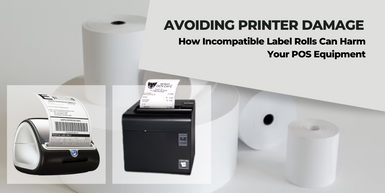Posted by LabelWarehouse on 19th Mar 2024
How Incompatible Label Rolls Can Damage Your POS Equipment and How to Prevent It
Understanding the Importance of POS Systems in Modern Business
Point of Sale (POS) systems stand as integral components in contemporary business operations, serving as pivotal tools that streamline transactions and elevate customer service standards. These systems facilitate efficient and secure payment processing, inventory management, and customer interaction, contributing to the overall operational efficiency of businesses. Despite their significance, the seamless functioning of POS equipment hinges on the compatibility of various accessories, with label rolls being a critical element. Label rolls play a crucial role in printing receipts and labels for products, ensuring accurate and efficient transactions. The proper alignment and compatibility of label rolls with POS printers are essential for preventing disruptions, such as jams and misprints that can compromise the effectiveness of the entire POS system.
In this blog post, we will explore the potential damage that incompatible label rolls can inflict on your printer and discuss the importance of choosing the right label rolls to minimise jamming.
Before diving into the topic, let’s throw some light into label rolls.
Different Types of Label Rolls You Should Know
Label rolls are continuous rolls of adhesive-backed labels used in various applications for printing information such as product labels, barcodes, shipping labels, and receipts. These rolls are commonly utilised with label printers and Point of Sale (POS) systems to create on-demand labels for products or transactions. Label rolls come in different types, each designed for specific printing technologies and applications.
Here are some common types of label rolls:
- Direct Thermal Labels: Direct thermal labels are coated with a heat-sensitive layer. When exposed to the heat from the printer's printhead, the coating darkens, creating the desired image or text. These labels are commonly used for short-term applications such as receipts and shipping labels.
- Thermal Transfer Labels: Thermal transfer labels require a ribbon to transfer the ink onto the label material. The printer's printhead heats the ribbon, transferring the ink onto the label. This method produces durable and long-lasting labels suitable for product labelling and asset tagging.
- Synthetic Labels: Synthetic labels are made from materials like polyester or polypropylene, offering enhanced durability and resistance to water, chemicals, and tearing. These labels are ideal for applications where durability is crucial, such as outdoor labelling or in challenging environments.
- Paper Labels: Paper labels are cost-effective and commonly used for a variety of applications, including product labelling, barcoding, and general-purpose labelling. They come in different finishes, such as matte or glossy, to suit specific aesthetic preferences or functional requirements.
- Removable Labels: Removable labels have a less aggressive adhesive, allowing them to be easily removed without leaving residue behind. These labels are suitable for temporary applications, such as promotions, pricing, or labelling items with changing information.
- Colour-Coding Labels: Colour-coding labels come in various colours, allowing for easy categorisation and organisation. These labels are often used in inventory management, file organisation, or to highlight specific information on products.
- High-Temperature Labels: High-temperature labels are designed to withstand elevated temperatures, making them suitable for applications like labelling items in manufacturing processes or for tracking products through heat-intensive stages.
How Incompatible Label Rolls Can Harm Your POS Printer
Incompatible label rolls can inflict significant harm on your Point of Sale (POS) equipment, jeopardising the smooth operation of essential business processes. The negative impacts arise from a lack of alignment between the label rolls and the specifications of the POS printer.
Frequent Jamming Issues
One of the most immediate and noticeable consequences of incompatible label rolls is frequent jamming within the printer. When the labels do not align correctly with the printer's sensors and rollers, the mechanism can seize, causing disruptions in the printing process. Persistent jamming not only halts transactions but also places undue stress on the internal components of the POS equipment.
Sensor Misalignment and Printing Errors
POS printers are equipped with sensors designed to detect gaps between labels, ensuring accurate printing. Incompatible label rolls may cause misalignment of these sensors, leading to inaccurate detection of label gaps. This misalignment can result in printing errors, including skewed labels or gaps where they shouldn't be, impacting the overall quality of printed information.
Printhead Damage and Costly Repairs
The printhead is a critical component of POS printers responsible for transferring ink onto labels. Continuous use of incompatible label rolls can lead to printhead damage. Misaligned labels and persistent jamming can cause scratches, overheating, and premature wear on the printhead. This damage not only compromises the quality of prints but also necessitates costly repairs or even premature replacement of the printhead.
Decreased Print Quality and Professionalism
Incompatibility issues can lead to reduced print quality, affecting the readability of barcodes, text, and other essential information. This not only diminishes the professional appearance of printed materials but can also impact the efficiency of scanning and data collection processes, ultimately hindering the effectiveness of your POS system.
Disruption to Workflow and Customer Experience
The harm caused by incompatible label rolls extends beyond the technical aspects to disrupt the overall workflow. When POS equipment is constantly dealing with issues like jamming or misprints, it leads to operational inefficiencies and frustrated staff. This, in turn, can affect customer service, as delays and errors in transactions may result in a negative experience for patrons.
To mitigate these risks and ensure the longevity of your POS equipment, it is crucial to invest time in selecting the right label rolls that align with the specifications outlined by the printer manufacturer. This proactive approach not only safeguards your equipment but also contributes to the seamless functioning of your POS system, promoting a positive customer experience and sustained business operations.
How to Choose the Right Label Rolls for Your POS Equipment
Selecting the right label rolls for your Point of Sale (POS) equipment is crucial to ensure optimal functionality and prevent issues such as jamming.
Refer to Your POS Printer’s Specifications
Begin by consulting your POS printer's user manual or specifications. Identify the recommended label roll specifications, including the type of labels, size, and core diameter that your printer is designed to accommodate. Following these guidelines ensures that the labels align correctly with the printer's mechanisms, reducing the likelihood of jamming.
Invest in High-Quality Label Materials
Opt for label rolls from reputable suppliers that offer high-quality materials. High-quality labels are less prone to tearing, misalignment, and adhesive issues, minimising the risk of jamming. Reliable suppliers often provide labels specifically designed for compatibility with various POS printers.
Match the Label Technology with Your Printer Type
Different POS printers use varying technologies, such as thermal or thermal transfer printing. Ensure that the label rolls you choose are compatible with your printer's technology. Additionally, consider the label material based on your specific needs—whether it's thermal paper, direct thermal labels, or synthetic materials. The right material contributes to smooth printing and minimises the chances of jamming.
Ensure Correct Size and Core Diameter
Accurate sizing is crucial to prevent jamming. Choose label rolls that match the correct size and core diameter specified by your POS printer. Labels that are too large or too small may lead to misalignment issues, causing jams during printing.
Optimise Label Sensing Accuracy
POS printers often use sensors to detect gaps between labels, ensuring precise printing. Choose label rolls that allow the sensors to function accurately. Proper label sensing minimises the risk of misprints, overlapping labels, and, consequently, jamming.
Maintain and Clean Your POS Equipment Regularly
Regular maintenance of your POS printer is essential to prevent issues like jamming. Clean the printhead and other relevant components following the manufacturer's guidelines. Dust, debris, or residue can accumulate over time, leading to printing errors and potential jams.
Test Label Rolls Before Bulk Purchase
Before purchasing label rolls in bulk, conduct a small-scale test to ensure compatibility with your POS equipment. This allows you to identify any issues beforehand and choose an alternative if needed, reducing the risk of jamming on a larger scale.
Factor in Environmental Conditions
Factor in the environmental conditions where your POS equipment operates. Some label materials may be better suited for specific environments, such as high humidity or extreme temperatures. Choosing labels that can withstand these conditions contributes to the longevity of the equipment and minimises jamming risks.
Conclusion: Choose the Right Label Rolls to Extend Your POS Printer's Life
Incompatible label rolls may seem like a minor concern, but they can have a significant impact on the efficiency and lifespan of your POS equipment. To avoid printer damage and minimise jamming issues, take the time to select the right label rolls based on your printer's specifications. By investing in compatible and high-quality labels, you can ensure a seamless POS experience for both your staff and customers, ultimately contributing to the overall success of your business.
If you are looking to buy the best label rolls for your printer at competitive prices, Label Warehouse is your one-stop shopping destination. Browse through our expansive inventory and shop today!

